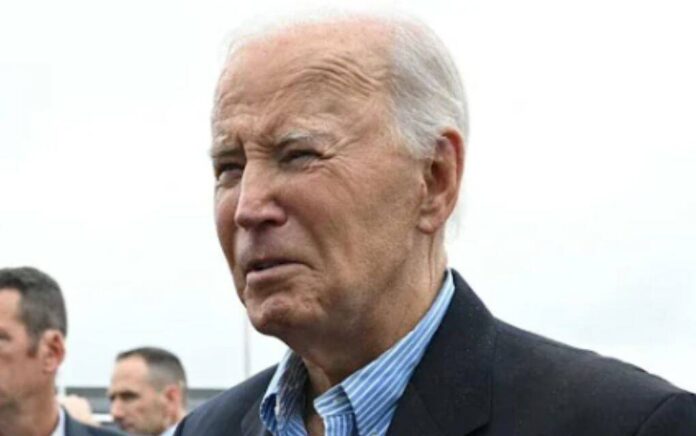
The Biden crime family runs deep. They try to skirt justice anyway they can.
And Joe Biden is being watched like a hawk for potentially breaking this major law.
President Joe Biden’s history with classified documents has cast new light on the upcoming presidential transition to Donald Trump. Both leaders have been criticized for mishandling sensitive materials in the past, raising questions about how each will approach the transition process this time.
The similarities in their records are striking. Each has faced accusations over the improper handling of classified information after leaving office. “The president is committed to making sure this transition is effective and efficient, and he’s doing that because this is the norm,” said White House Press Secretary Karine Jean-Pierre on Tuesday. “But also because this is the right thing to do for the American people.”
It’s a goal that has proven elusive in past transitions. In August 2022, the FBI raided Trump’s Mar-a-Lago residence, seizing documents from his first term stored there. The following month, Biden questioned “how … anyone could be that irresponsible” in leaving classified documents unsecured.
But just weeks later, sensitive materials from the Obama-Biden administration were found in Biden’s private office, and reports surfaced that Biden knew about classified documents in his home as early as 2017.
As both leaders prepare for the upcoming transition, frustrations have surfaced across the political spectrum. Bradley Moss, a national security attorney and critic of Trump’s document storage practices at Mar-a-Lago, argued that Trump’s lack of consequences could make Biden less inclined to comply fully.
Biden could “straight up walk out of the White House with whatever classified documents he wants, give everyone the middle finger while chanting ‘Presidential Records Act,’ and claim immunity,” Moss said to the Washington Examiner. “Of course, no one expects President Biden to do anything like that. The expectation is that his team is being particularly careful to avoid any inadvertent removal of classified records over the next months.”
However, some insist that more stringent measures should be taken to prevent any mismanagement of records. Mike Howell, director of the Heritage Foundation’s Oversight Project, feels Biden’s record requires additional scrutiny and criticized suggestions that Trump has escaped accountability. “President Biden tried to put Trump in jail for the rest of his life,” Howell said. “He wanted Trump to die in jail. I don’t think that because Biden shows up for customary tea party that he is forgiven.”
The “tea party” meeting is a reference to the Wednesday Oval Office meeting between Biden and Trump, part of Biden’s efforts to facilitate a smoother transition than the one he experienced in 2020.
Unlike Trump, Biden has not faced criminal charges related to classified documents, with Special Counsel Robert Hur concluding that Biden would likely appear to a jury as a “sympathetic, well-meaning, elderly man with a poor memory.” However, Republicans in Congress remain wary of Biden’s team handling records appropriately.
House Oversight Committee Chairman James Comer expressed skepticism over Biden’s transparency: “The White House has not been truthful about the timeline surrounding the discovery of classified documents that President Biden stored at the Penn Biden Center.”
In February, Biden announced a Presidential Records Transition Task Force to address longstanding issues with document management. Yet, the task force has remained largely inactive, leaving many wondering if it will meaningfully impact the process.
Adding another layer to the transition’s complexity, Trump has yet to engage with the General Services Administration (GSA) as part of the official process. The GSA provides essential support, including office space, equipment, and administrative services, as mandated by the Presidential Transition Act.
Trump’s reluctance has prevented him from receiving national security briefings, which national security analyst Irina Tsukerman suggested may slow his team’s response to crises upon taking office.
“Unless he signs off on the documentation to obtain this information from the Biden administration, in all likelihood he will not be gaining access to it until the inauguration,” she noted. Trump allies have suggested he should privately fund his transition to reduce potential government influence.
Tsukerman also advocated for procedural reforms regarding the handling of classified materials, arguing that “prison terms should very much be on the table” to deter officials from mismanaging sensitive information. She also called for ending executive privilege and immunity after presidents leave office.
Congressional Republicans have pledged to oversee the final two months of Biden’s term. Rep. August Pfluger voiced concern, saying, “Any individual in the federal ranks who destroys records to conceal information from the newly elected administration should face consequences. Expectations for a peaceful transfer of power should encompass the entire administration, and not just the Office of the President.”
With Biden’s departure scheduled for January 20, both the media and lawmakers are set to watch closely, hoping this transition will avoid his past controversies regarding classified documents.
Stay tuned to The Federalist Wire.


















